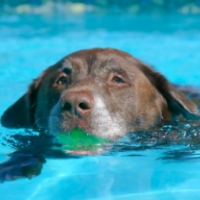- Services
- We strive to provide complete care for our patients. Learn more about all the services we provide.
WARNING
You are using an outdated browser. Please upgrade your browser to improve your experience.
 |
| What About the Pool? |
|
1. Giardia can live for up to an hour even in a well-maintained pool, and much longer, potentially forever, in a poorly maintained pool. 2. Keep your pool in the best condition by checking the pH and chlorine levels regularly. You can obtain test strips at a home improvement store, but you should check the expiration dates. 3. The chlorine level should be 1 to 3 ppm. 4. The pH should be in the 7.2 to 7.8 range. 5. Don't allow your dogs into the pool unless they have a negative stool test. 6. Don't allow anyone (people or pets) into the pool if they have diarrhea. 7. People should practice good hygiene before entering the pool and while in the pool. |
If you have a friend who camps or fishes, you may have heard that they had been infected with Giardia. Or your veterinarian may have told you that your cat or dog had Giardia. In either case, you probably wondered, can I catch it as well?
Giardia is a protozoan parasite (one-celled organism) that can infect a variety of species, including pets and people. The human form of Giardia really likes people, the canine form likes dogs, the feline form likes cats, and the ruminant form likes cows and sheep. But it is possible for any of the forms to infect any of the other species.
In an animal or a person, Giardia lives in the intestinal tract. It may cause no symptoms, especially at first, but with time and as the organism becomes more numerous as it propagates, diarrhea commonly occurs. Some people may have more long standing or severe disease; then the symptoms can also include abdominal cramping, nausea, vomiting, loss of appetite, and weight loss. Pets also get diarrhea when infected, but they tend to get diagnosed faster as it is common to do regular fecal testing in veterinary medicine.
Giardia cysts are passed in the feces of infected animals and people. These cysts are resistant to environmental extremes, and thus can live in feces or fecal contaminated soil, surfaces, and especially water, for a long time.
Pets and people are usually exposed from contaminated sources in the environment. Giardia is a common cause of recreational water illness, from pools, water parks, water play areas, hot tubs, lakes, rivers, ponds, streams, and oceans. Pets and people swallowing even a small amount of water can become infected. You share the water, and the germs in it, with every person or animal who enters that water. The infective Giardia cysts can also be present on other surfaces contaminated with feces such as bathroom fixtures, changing tables, diaper pails, and toys. Uncooked, fresh produce can be contaminated as well.
Luckily, Giardia is easily diagnosed in veterinary medicine. There are two tests commonly performed: a microscope test call an "ova and parasite" (O&P;) where the technician looks for the presence of the parasite in a solution made from the feces and then centrifuged. The other test also uses a stool sample, but uses a more sophisticated method to check for any DNA of the Giardia parasite.
Treatment is usually very rewarding. Drugs commonly used are metronidazole or fenbendazole, although in stubborn cases they may be used at the same time.
What can you do to prevent infection in the first place? Have your pets' stool checked regularly for parasites (at least twice yearly). Practice strict hygiene, cleaning surfaces that could become contaminated by stool. Wash your hands after going to the bathroom, and insist your children do as well. Every day, place any dog and cat feces from your property into plastic bags that will go to a landfill. If you have a pool, keep it well maintained, don't allow any person or pet in the pool if they have diarrhea, and have everyone shower (with soap) before entering the pool. Don't allow children to defecate while in the pool. Don't swallow any water when you are in a pool or any other type of recreational water. Wash all produce well before consuming.
Giardia is a common parasite. Your veterinarian can check your pets for Giardia by performing a stool test, and treat if necessary. You can prevent your family from being infected by some common sense, good hygiene practices.
Sources:
Companion Animal Parasite Council
Centers for Disease Control and Prevention
Exclusive Offer
FREE Nail Trim! An $11 value - just mention the webpage!
Sign-up using the form or call us at 406-522-9491 to take advantage of this exclusive offer.
Office Hours
| Day | Open | Close |
|---|---|---|
| Monday | 8:30am | 5:30pm |
| Tuesday | 8:30am | 5:30pm |
| Wednesday | 8:30am | 5:30pm |
| Thursday | 8:30am | 5:30pm |
| Friday | 8:30am | 5:30pm |
| Saturday | Closed | Closed |
| Sunday | Closed | Closed |
| Day | Open | Close | ||||
|---|---|---|---|---|---|---|
| Monday | Tuesday | Wednesday | Thursday | Friday | Saturday | Sunday |
| 8:30am | 8:30am | 8:30am | 8:30am | 8:30am | Closed | Closed |
| 5:30pm | 5:30pm | 5:30pm | 5:30pm | 5:30pm | Closed | Closed |
Testimonial
So impressed with how Sue and Cara cared for our dog Fritz for many years until he passed away at age 15 in February. The two dogs we currently have are also so lucky to see Sue and Cara.
What can we help you find?